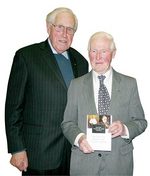Reminiscing about world health breakthroughs
 Alumni Alumni
Two of the University of Adelaide's most distinguished graduates - both known for their breakthroughs in world health - met at the University's Barr Smith Library recently to launch a book and reminisce about life in the health sciences and world-changing research. Professor Frank Fenner CMG MBE AC is credited with overseeing the eradication of smallpox and controlling Australia's rabbit plague through the introduction of myxomatosis. The Hon. Dr Basil Hetzel AC made a difference to the lives of millions with his discovery in the 1960s that iodine deficiency was the cause of severe brain damage among Papua New Guinean highlanders. The global prevention of this problem became his life's work. Both men are medicine graduates of the University of Adelaide and Dr Hetzel is a former Professor of Medicine at the University. At the Barr Smith Library, Education and Children's Services Minister the Hon. Jane Lomax-Smith launched Professor Frank Fenner's latest book, The Lives of Frank and Charles Fenner, and University of Adelaide Vice-Chancellor Professor James McWha welcomed the two back to the University. The book is about Professor Fenner and his father Charles, also associated with the University. Charles Fenner was South Australian Director of Education from 1939 to 1946 and integral in establishing geography studies at the University. Distinguished by numerous awards, Professor Frank Fenner won the Japan Prize for preventative medicine in 1988, the Prime Minister's Science Prize in 2002 and just this year was named ACT Senior Australian of the Year. He had an outstanding career as a microbiologist and world expert on pox-virus. He was Chairman of the Global Commission for the Certification of Smallpox Eradication and, in 1980, he announced the eradication of smallpox to the World Health Assembly. The book launch was followed by a conversation between Professor Fenner and Dr Basil Hetzel in the Barr Smith Library's magnificent Reading Room. Story by Robyn Mills
|





